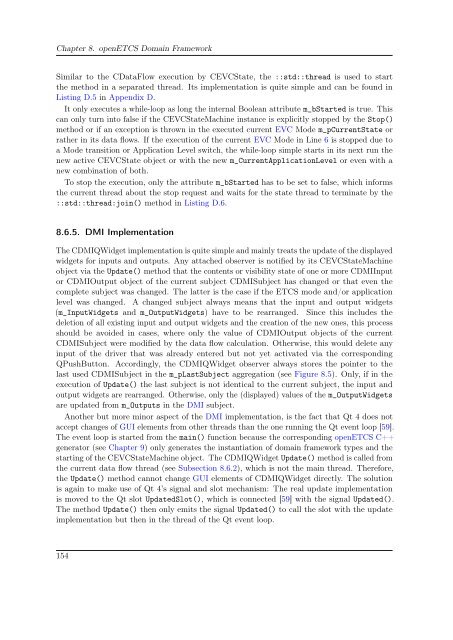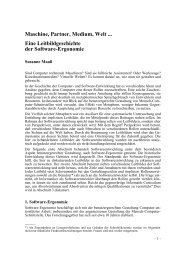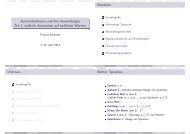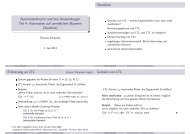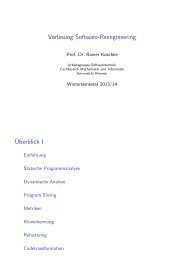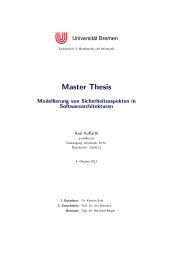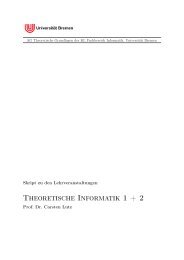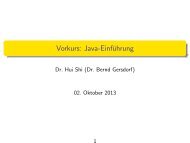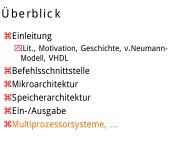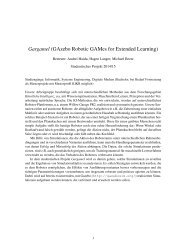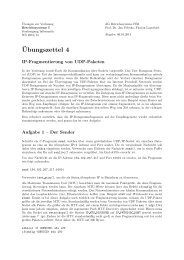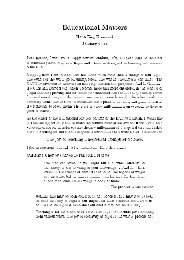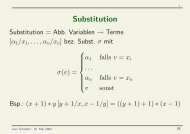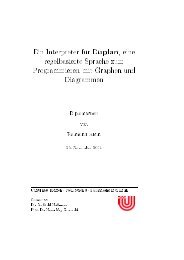Ph.D. - geht es zur Homepage der Informatik des Fachbereiches 3 ...
Ph.D. - geht es zur Homepage der Informatik des Fachbereiches 3 ...
Ph.D. - geht es zur Homepage der Informatik des Fachbereiches 3 ...
You also want an ePaper? Increase the reach of your titles
YUMPU automatically turns print PDFs into web optimized ePapers that Google loves.
Chapter 8. openETCS Domain Framework<br />
Similar to the CDataFlow execution by CEVCState, the ::std::thread is used to start<br />
the method in a separated thread. Its implementation is quite simple and can be found in<br />
Listing D.5 in Appendix D.<br />
It only execut<strong>es</strong> a while-loop as long the internal Boolean attribute m_bStarted is true. This<br />
can only turn into false if the CEVCStateMachine instance is explicitly stopped by the Stop()<br />
method or if an exception is thrown in the executed current EVC Mode m_pCurrentState or<br />
rather in its data flows. If the execution of the current EVC Mode in Line 6 is stopped due to<br />
a Mode transition or Application Level switch, the while-loop simple starts in its next run the<br />
new active CEVCState object or with the new m_CurrentApplicationLevel or even with a<br />
new combination of both.<br />
To stop the execution, only the attribute m_bStarted has to be set to false, which informs<br />
the current thread about the stop requ<strong>es</strong>t and waits for the state thread to terminate by the<br />
::std::thread:join() method in Listing D.6.<br />
8.6.5. DMI Implementation<br />
The CDMIQWidget implementation is quite simple and mainly treats the update of the displayed<br />
widgets for inputs and outputs. Any attached observer is notified by its CEVCStateMachine<br />
object via the Update() method that the contents or visibility state of one or more CDMIInput<br />
or CDMIOutput object of the current subject CDMISubject has changed or that even the<br />
complete subject was changed. The latter is the case if the ETCS mode and/or application<br />
level was changed. A changed subject always means that the input and output widgets<br />
(m_InputWidgets and m_OutputWidgets) have to be rearranged. Since this includ<strong>es</strong> the<br />
deletion of all existing input and output widgets and the creation of the new on<strong>es</strong>, this proc<strong>es</strong>s<br />
should be avoided in cas<strong>es</strong>, where only the value of CDMIOutput objects of the current<br />
CDMISubject were modified by the data flow calculation. Otherwise, this would delete any<br />
input of the driver that was already entered but not yet activated via the corr<strong>es</strong>ponding<br />
QPushButton. Accordingly, the CDMIQWidget observer always stor<strong>es</strong> the pointer to the<br />
last used CDMISubject in the m_pLastSubject aggregation (see Figure 8.5). Only, if in the<br />
execution of Update() the last subject is not identical to the current subject, the input and<br />
output widgets are rearranged. Otherwise, only the (displayed) valu<strong>es</strong> of the m_OutputWidgets<br />
are updated from m_Outputs in the DMI subject.<br />
Another but more minor aspect of the DMI implementation, is the fact that Qt 4 do<strong>es</strong> not<br />
accept chang<strong>es</strong> of GUI elements from other threads than the one running the Qt event loop [59].<br />
The event loop is started from the main() function because the corr<strong>es</strong>ponding openETCS C++<br />
generator (see Chapter 9) only generat<strong>es</strong> the instantiation of domain framework typ<strong>es</strong> and the<br />
starting of the CEVCStateMachine object. The CDMIQWidget Update() method is called from<br />
the current data flow thread (see Subsection 8.6.2), which is not the main thread. Therefore,<br />
the Update() method cannot change GUI elements of CDMIQWidget directly. The solution<br />
is again to make use of Qt 4’s signal and slot mechanism: The real update implementation<br />
is moved to the Qt slot UpdatedSlot(), which is connected [59] with the signal Updated().<br />
The method Update() then only emits the signal Updated() to call the slot with the update<br />
implementation but then in the thread of the Qt event loop.<br />
154


